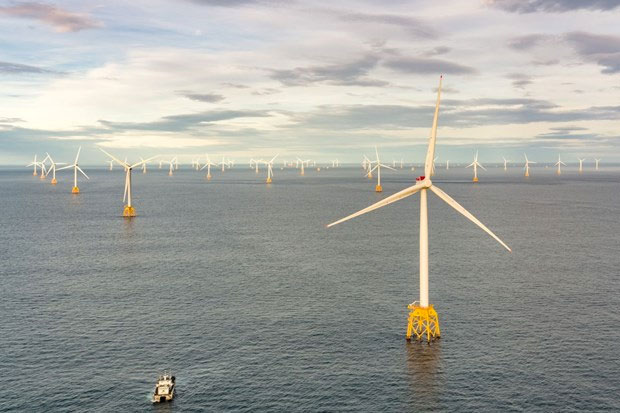SSE have said that energy is an essential service and rising prices are "always difficult" but renewables can limit the impact of surging global fuel costs.
SSE have responded to an announcement from Ofgem that the energy price cap is to be increased reflecting consistently high global gas prices seen in recent months.
In response SSE Director of Corporate Affairs, Sam Peacock, said: "Ofgem explained the hike was the result of 'surging global fossil fuel prices', with gas prices reaching a record high post-lockdown, resulting in a more than 50% increase in energy costs.
"The average £139 bill increase serves to underline just how susceptible we still are in GB to volatile international commodity markets and how ultimately that can hit consumers where it hurts.
"It also shows just how difficult it is to balance what's often referred to as the energy trilemma: ensuring energy is affordable, reliable and sustainable.
"But the answer is blowing in the wind – renewables can deliver on all three.
"We have a rich, clean energy source on our doorstep. Renewables offer cheap energy security, indigenously produced, which in the long term will reduce our exposure to international fuel pricing whilst helping tackle climate change.
"Few would deny we are in the midst of a climate emergency. When COP26 comes to Glasgow in November, we need ambitious global agreement on how we phase out more polluting forms of power and move to systems not dependent on fossil fuels and - by extension - volatile global markets.
"Of course, there will be costs associated with this – but the devastating costs of inaction will be far greater in the long term and renewables hold the key to keeping the transition affordable.
"Government support mechanisms brought forward huge investment in renewables, and that has driven down costs. We've recently seen record low auction prices for offshore wind, which is now the cheapest deployable large-scale technology in the UK.
"Delivering renewables on the scale required, as well as integrating millions of electric cars and heat pumps, will require big investments in electricity networks to ensure they can facilitate this transformation. The good news is the latest proposals from network operators would see costs on household bills kept flat.
"And businesses like ours are continuing to innovate, investing in new technology like carbon capture, long duration storage, floating wind, not to mention embracing digitisation across the energy industry. The pace of change in the next decade will continue as we extend the use of low-carbon electricity across the economy. If we do it right, this transition will minimise the cost to bill payers.
"If we want to keep costs down, we need renewables.
"If we want to have any chance of halting climate change, we need renewables.
"If we want to keep the lights on, we need renewables.
"We commissioned a report from LCP on how Great Britain can reach net zero without breaking the bank. It found five steps to cut carbon - and do it quicker and cheaper.
"Firstly, going big on offshore wind will save the UK £7.3bn by 2050. As an island we have an abundance of clean, green renewable energy on our doorstep and we should use it to our advantage. We have a head start.
"Secondly, we'll still need gas as a transition technology for when the wind isn't blowing and the sun isn't shining, but new technologies like carbon capture and storage alongside hydrogen will support decarbonisation, particularly in hard to abate industry.
"We can also use renewables more flexibly, shifting demand, deploying batteries, hydro pumped storage and green hydrogen to bank clean electricity. LCP modelled this as saving £4.9bn.
"What's clear is the electricity market must evolve to value all low carbon power equally and avoid building more new assets than we need. This can deliver one of the singular biggest savings with £19.7bn to be shaved off whilst a coordinated approach to offshore transmission would cut costs by £8.8bn.
"That's total savings of £48bn by 2050 and a huge 19.8m tonnes of CO2 avoided.
"The short of it is that getting on with net zero now – in the right way - will save billions in the years to come and avoid storing up problems for bill payers down the line. Critically, it will also reduce our exposure to volatile global commodity markets by increasing our ability to produce clean, cheap and secure electricity on (or off) our own shores.
"This is the time to lean into a green recovery. Invest in the green technology. And speed up the pace of change – if we're to secure the long-term future of our planet."
Time and date
CONSTRUCTION DIRECTORY
Construction News
10/08/2021
Renewables Can Limit The Impact Of Surging Global Fuel Costs - SSE

Latest Construction News
15/11/2024
A major milestone has been reached in the UK's transition to a greener energy future. Ofgem has approved the Eastern Green Link 1 project, a £2.5 billion investment that will see the installation of a 196km subsea electricity cable between Scotland and England. The project, a joint venture between ...
15/11/2024
Falkirk Council has secured a £100 million Growth Deal that is expected to create 1,660 jobs and generate £628 million in economic benefits for the area. The Deal, signed by the UK and Scottish Governments, will fund 11 projects, including: • A Carbon Dioxide Utilisation Centre • A Bioeconomy ...
15/11/2024
The Scottish Plant Owners Association (SPOA) has raised concerns that the measures announced in the Autumn Budget could lead to the demise of the plant hire industry in Scotland. The association argues that the increased tax burden and other economic pressures will have a significant negative ...
15/11/2024
Maxi Construction has been awarded a £1.6 million contract by The City of Edinburgh Council to replace the Reinforced Autoclaved Aerated Concrete (RAAC) roof at Pentland Primary School. The phased project will involve the removal of existing roof coverings and ceilings, the replacement of RAAC ...
15/11/2024
Clark Contracts has been awarded a contract to retrofit Scotland's National Retrofit Centre at BE-ST's Innovation Campus. The project aims to transform the building into a living laboratory, showcasing best practices in non-domestic retrofit. The ambitious project will involve a range of ...
15/11/2024
The Scottish Government has announced plans to bypass the villages of Springholm and Crocketford on the A75, a key route linking Scotland to Ireland. Jacobs UK Ltd has been awarded a contract to undertake initial design and assessment work for the bypass. The project is funded by the UK ...
15/11/2024
Dundee City Council has secured a £693,383 grant from the Scottish Government's Recycling Improvement Fund to upgrade its recycling facilities at Baldovie and Riverside. The funding will be used to purchase new waste management equipment, such as roll packers and compactors, to improve efficiency ...
15/11/2024
Homes for Good and Glasgow Credit Union have formed a partnership to address housing inequality in Glasgow and neighbouring areas. Glasgow Credit Union has provided a £2.4 million loan to Homes for Good, which will be used to purchase up to 35 homes for low-income individuals and families. The ...
15/11/2024
The historic Troon station has reopened following a £5m restoration project. The station was extensively damaged by a fire in 2021. Network Rail, in partnership with AmcoGiffen and CPMS, undertook the rebuild, which included the restoration of the station's iconic façade while incorporating modern ...
15/11/2024
BEAR Scotland, on behalf of Transport Scotland, is undertaking emergency works on the A828 between Ledaig and Benderloch to address a safety concern related to a deteriorating rock face. Recent monitoring has identified a fractured rock mass 60 metres above the road, requiring urgent attention. To ...

















